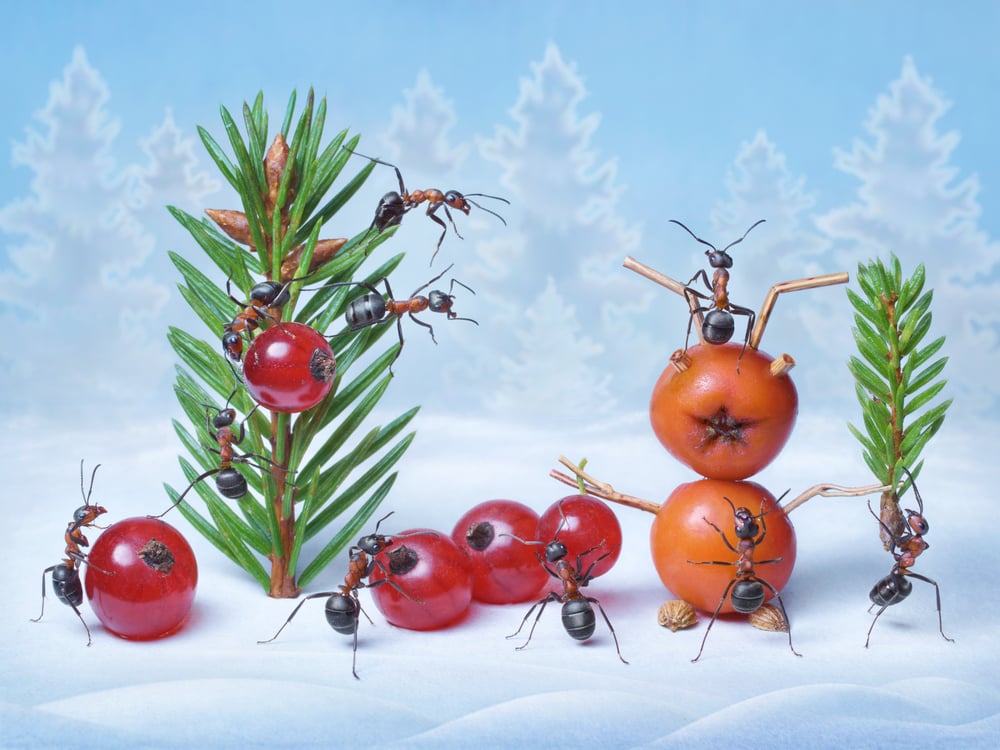Your Christmas tree. You’ve decorated it with lights, bells, family pictures; there’s even an angel on top. You close your eyes and breathe in the smell of fresh pine from your all-natural Christmas tree. No plastic tree in this house! Ah, there’s nothing quite like it. But wait, what’s that crawling up your arm? An ant?! How did he get here? And there’s another one. Where the hell did they come from? Meet the odorous house ant, public enemy number one of Christmas trees. We can’t stop your in-laws from dropping by this Christmas, but here’s how to keep your Christmas tree a no-crawl zone for ants.
THE CULPRIT
Would the real culprit please stand up! Measuring 2.4 to 3.3 mm in length, the odorous house ant has a dark brown or black body with one node on their petiole, which is hidden by their abdomen. These ants have bumpy and rigid thorax and emit a rotten odour when crushed. You can find them inside and outside, constantly searching for new sources of food. They are patient when standing in line, and are often foraging in trail formation, making them easy to spot. They hate the wet and cold, so are often found inside buildings nesting beneath the floor or in the walls. While odorous house ants do not sting or bite, they can become persistent pests, travelling indoors in large numbers and easily finding and contaminating food supplies.
THE PROBLEM
Trees grow in woods, where there is an abundance of insect life, and odorous house ants simply love the sugary sap from Christmas trees and want nothing more than a nice cosy place to spend the winter months. They hitch a ride indoors to where it’s warm. Once there they build, forage, and, when they have the time, reproduce. The queens of an odorous ant colony can produce thousands of workers. Unless contained, an ant infestation will continue to spread beyond the tree into wall crevices, under carpets, beneath flooring, and into heaters and water pipes.
THE SOLUTION
Prevention is always better than reaction, so do all you can to stop the ants from coming in to your home in the first place. Inspect your tree carefully before you purchase it. Mechanical tree shakers, available at some retail lots, are useful in removing some insects from the trees. Vigorously shaking the tree before bringing it into your home will serve the same purpose, and, as an added bonus, will also remove any loose needles you’ll just have to vacuum up later. If the little critters make it inside, don’t squish them. It’ll just create a mess and, with the odorous house ant, you’ll get a whiff of something akin to rotten coconut sun tan lotion. Instead use a vacuum cleaner to suck them up. Aerosol insect sprays are flammable and should not be sprayed on the Christmas tree. Another side-effect of spraying (as if running the risk of starting a fire in your home wasn’t enough) is that it may cause the ants to spread to other parts of the home that were previously unaffected, thereby actually exacerbating the infestation. Other pest control tactics are available, such as bait and perimeter and nest treatments.
If the infestation continues, get rid of the tree. If this doesn’t work, then the colony has already formed inside your house and it’s time to call in the pest control experts who will focus on colony elimination rather than just a quick fix. The experts will treat all the entry points (doors, window frames, garage) to your home and use a combination of safe chemicals to make sure your unwanted house guests leave and don't return.
Yes, ants are fascinating, hard-working, and relentlessly resourceful insects. We respect them, and I’m sure you do too. But, also like you, we don’t want them helping us open our presents on Christmas morning. Do all that you can to prevent ants from entering your home in the first place. And if they’ve already taken up residence, call BugMaster Pest Control. We’ll make sure the ants get the message and bug off!
Our free guide is also a great place to start! We've created a handy resource for you to keep on hand, with simple tips and tricks to keep your home ant free!



